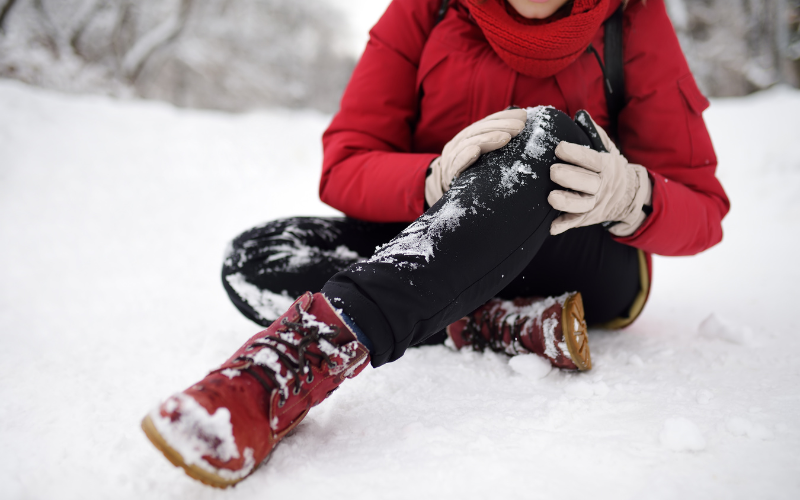
New Jersey winters can bring extreme weather, including sleet, blizzards, and other winter storms. Snow and ice can create slippery, hazardous conditions, from which property owners have a legal duty to protect their visitors. This applies to business owners, homeowners, and those who own other private properties. If a property owner fails to take reasonable steps to protect visitors from dangerous conditions, they could be financially liable for any harm that results. In this article, we’ll examine the duties of different types of property owners to mitigate winter hazards as well as how injured parties can seek recovery.
Premises Liability on Private Property
Private property owners and renters must reasonably maintain their property to keep it safe for visitors. This means they should address known hazards as much as possible and, in the meantime (or when eliminating a hazard isn’t feasible), warning visitors of its existence. If a homeowner is negligent in maintaining their property, they could open themselves to liability for injuries that result.
Failure to remove snow and ice from driveways and walkways on the property could constitute negligence in this regard. Some New Jersey jurisdictions also require homeowners to keep the sidewalks around their home clear of snow and ice and impose fines for failing to do so. However, New Jersey law does not provide a cause of action against private homeowners for falls that occur on public sidewalks.
Premises Liability on Commercial Property
Those who own or rent commercial property are held to a higher standard under premises liability law than private landowners. Business owners are expected to regularly inspect their properties to uncover potential hazards and then take reasonable steps to warn visitors of their existence and eliminate them. This duty applies to parking areas, walkways, and any other publicly accessible areas of the property.
Ongoing Storms
When a winter storm is raging, it’s often not practical or even safe to attempt to remove snow and ice immediately. New Jersey courts provide an exception in these circumstances, known as the “ongoing storm rule.” The NJ Supreme Court has held that, “Commercial landowners do not have a duty to remove the accumulation of snow and ice until the conclusion of the storm.” However, they may still have a duty to mitigate such hazards during a storm in “unusual circumstances,” such as when a property owner’s actions increase visitors’ risk or when hazardous conditions existed before the storm began.[1]
The ongoing storm exception was recently upheld in a lawsuit against Costco and its snow removal company. In 2018, plaintiff Carol Smith drove to Costco in the midst of a snowstorm that had prompted the governor to declare a state of emergency. As she began to walk from the store to her vehicle, she slipped and fell. At the time, several inches of snow covered the ground. The court held that the ongoing storm rule applied, relieving Costco and its contractor of legal liability for her injuries.[2]
Seeking Legal Recovery After a Slip-and-Fall Injury
If you’ve been injured on someone else’s property, you may have a cause of action against the property owner, renter, or other parties who have a duty to maintain it. The central question is whether you were owed a duty of care and whether that duty was breached. As mentioned above, the duty of a private property owner is less extensive than that of a business owner. Additionally, that duty applies only to those who are on the property for a lawful purpose. So, for example, a person who is trespassing at the time of an injury may not be able to recover from the property owner.
In some circumstances, property owners who fail to adequately maintain their properties can be subject to punitive damages in addition to liability for visitors’ injuries. However, punitive damages are available only if the failure to maintain the property was malicious or demonstrated willful disregard for visitors’ safety.[3] Additionally, to be awarded punitive damages, a plaintiff must request them in their complaint to the court.[4]
After an injury on commercial or private property, it’s important to consult with a lawyer with experience in personal injury law in your area. They can help ensure that your complaint is complete, accurate, and creates a solid foundation for your case. They can also help identify all parties who may be liable, such as property owners, renters, and contractors. The personal injury experts at the Mark Law Firm can provide a free initial consultation to discuss the facts of your case and assess its potential for successful resolution. To learn more about working with us, visit our FAQ page.
[1] Pareja v. Princeton International Properties. 246 N.J. 546 (N.J. 2021)
[2] Smith v. Costco Wholesale. Superior Court of New Jersey Appellate Division. Docket No. A-2592-21. Decided July 3, 2023.
[3] NJ Rev Stat § 2A:15-5.12 (2022).
[4] NJ Rev Stat § 2A:15-5.11 (2022).


.svg)